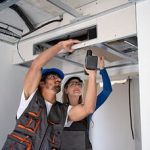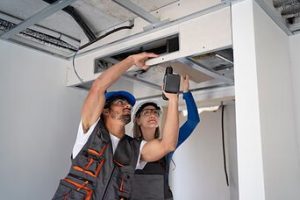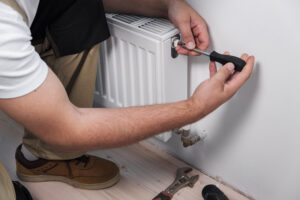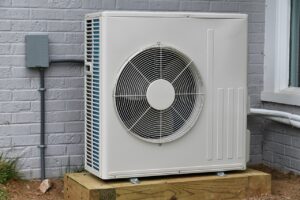
Heating, Ventilation, and Air Conditioning (HVAC) systems are integral to the comfort of modern homes and workplaces. However, when these systems malfunction, the decision to undertake a DIY repair or hire a professional can be challenging.
This blog delves into the pros and cons of both approaches, providing valuable insights to help you make an informed choice. Whether you’re a hands-on homeowner or someone who prefers expert assistance, understanding the risks and benefits of each option is crucial.
Understanding Your HVAC System
Before diving into repair options, it’s essential to understand the complexity of your HVAC system. These systems regulate indoor temperature, air quality, and humidity, consisting of components like compressors, condensers, evaporators, fans, filters, and ductwork. Given their intricate design, even a minor malfunction can impact efficiency and escalate energy costs.
Common HVAC issues include:
• Inconsistent heating or cooling
• Strange noises from the unit
• Poor airflow
• High energy bills
• Leaks or moisture accumulation
Recognizing these signs early can prevent minor issues from becoming costly repairs. But how do you decide whether to fix the problem yourself or call a professional?
DIY HVAC Repairs: Pros and Cons
Pros:
1. Cost Savings: One of the primary reasons homeowners opt for DIY repairs is to save money. Labor costs can be significant when hiring a professional, so handling minor issues yourself might seem economical.
2. Immediate Response: When your HVAC system breaks down, the ability to troubleshoot and address the problem immediately is appealing. Waiting for a technician might not always be convenient.
3. Learning Opportunity: Repairing your HVAC system can be a learning experience. Understanding its workings empowers you to perform basic maintenance and identify potential issues early.
Cons:
1. Safety Risks: HVAC systems involve electricity, refrigerants, and moving parts, all of which pose safety risks if mishandled. Improper handling can lead to injuries or further damage.
2. Limited Expertise: While online tutorials are abundant, they cannot replace the expertise of a certified technician. Misdiagnosing the problem can lead to ineffective repairs or worsen the issue.
3. Voided Warranties: Many HVAC systems come with warranties that require professional maintenance and repairs. DIY attempts could void these warranties, leaving you responsible for all future costs.
4. Hidden Costs: While DIY repairs may seem cost-effective initially, mistakes can result in more extensive damage, leading to higher expenses in the long run.
Professional HVAC Repairs: Pros and Cons
Pros:
1. Expertise and Experience: Professional technicians have years of training and experience, enabling them to accurately diagnose and resolve issues. They are also equipped with specialized tools and knowledge about various HVAC models.
2. Safety Assurance: Professionals are well-versed in handling hazardous materials and electrical components, ensuring repairs are conducted safely.
3. Long-Term Solutions: A professional repair job is more likely to address the root cause of the issue, offering a reliable and long-lasting solution.
4. Maintenance Benefits: Hiring a professional often includes additional benefits, such as preventive maintenance tips, which can extend the life of your HVAC system.
5. Warranty Compliance: Professional repairs maintain the integrity of your warranty, ensuring future repairs or replacements remain covered.
Cons:
1. Cost: Professional services come with a price tag, which may seem higher upfront compared to DIY solutions.
2. Scheduling Delays: Depending on the availability of technicians, you might have to wait for repairs, which can be inconvenient during extreme weather conditions.
3. Limited Hands-On Knowledge: Relying entirely on professionals might leave you less familiar with your HVAC system’s basic functions.
When to Opt for DIY Repairs
DIY repairs are suitable for minor issues that don’t involve complex components or safety hazards. Examples include:
• Replacing air filters
• Cleaning vents and ductwork
• Checking and resetting the thermostat
• Clearing debris around the outdoor unit
• Tightening loose screws or bolts
These tasks require minimal tools and expertise, making them manageable for most homeowners.
When to Call a Professional
For more complex issues, it’s best to leave the repairs to professionals. Situations requiring expert attention include:
• Refrigerant leaks
• Electrical problems
• Compressor or motor failure
• Persistent airflow issues
• Strange odors or noises
Attempting to fix these problems without the necessary expertise can result in further damage, safety hazards, and higher costs.
When in doubt, Turner Services On is your trusted partner for professional HVAC repairs. With a team of certified technicians, they ensure top-notch service, safety, and efficiency.
Preventive Maintenance: The Key to Fewer Repairs
Whether you choose DIY or professional repairs, regular maintenance is vital for your HVAC system’s longevity and efficiency. Here are some tips:
1. Schedule Annual Inspections: Have a professional technician inspect your system annually to identify and address potential issues.
2. Replace Filters Regularly: Dirty filters reduce airflow and strain the system. Replace them every 1-3 months.
3. Keep the Area Clean: Clear debris around your outdoor unit and ensure vents are unobstructed.
4. Check Thermostat Settings: Optimize your thermostat settings for energy efficiency and comfort.
5. Monitor Energy Bills: Sudden spikes in energy costs can indicate a problem with your HVAC system.
By staying proactive, you can reduce the likelihood of major breakdowns and costly repairs.
The Importance of Professional Expertise
While DIY repairs are tempting, the expertise of a professional cannot be understated. For instance, a refrigerant leak might seem like a minor issue, but it requires precise handling to avoid environmental harm and ensure compliance with regulations. Similarly, electrical issues pose severe safety risks if not addressed correctly.
With Turner Services On, you gain access to certified professionals who prioritize safety, efficiency, and customer satisfaction. From emergency repairs to routine maintenance, they have the expertise to keep your HVAC system in optimal condition.
Make the Right Choice for Your HVAC System!
Deciding between DIY and professional HVAC repairs ultimately depends on the complexity of the issue, your expertise, and your willingness to take risks. While DIY repairs can save time and money for minor issues, professional services offer safety,
reliability, and long-term solutions for more significant problems.
Investing in professional maintenance and repairs not only ensures the longevity of your HVAC system but also provides peace of mind knowing the job is done right. When it comes to your comfort and safety, trust the experts at Turner Services On to deliver exceptional results.
By balancing DIY efforts with professional assistance, you can enjoy a well-functioning HVAC system that keeps your home comfortable year-round.






